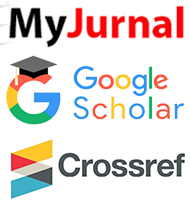Implementation of Islamic Religious Education Learning for Students with Special Needs (CASE STUDY: SLB 'AISYIYAH TEMBUNG)
Keywords:
Implementation, PAI Learning, Special NeedsAbstract
This study aims to describe the implementation of Islamic religious education learning for students with special needs at SLB 'Aisyiyah Tembung. Because man was created in the best form, then children with special needs like other children also have the right to get proper learning. So that in the process of implementation of education not only requires special services, but also needs strategies, methods, teachers even a special curriculum and coaching as well. The informants in this study were the Principals and Teachers of Islamic Religious Education with the condition of 135 students with details of 76 men and 59 women. They are accepted to the school because they fit the criteria of deafness and moderate disability. Based on the condition of the students, SLB 'Aisyiyah Tembung has a tremendous responsibility in carrying out the mandate to be able to provide the best service for its students. Moreover, for teachers to have more careful preparation in terms of the learning process that starts from planning, implementation, evaluation and strengthening can be realized to achieve educational goals in general and especially the effectiveness of learning for students with special needs. Descriptive research with qualitative approach. Data collection techniques using observations, interviews, and documentation. The interview was conducted to the Principal and Teacher of Islamic Religious Education to dig up information so that researchers get an in-depth understanding of the needs of this research. Data analysis techniques using qualitative descriptive analysis. It was found that islamic education learning planning for students with special needs in SLB 'Aiyiyah Tembung was implemented based on the national curriculum that has been determined by the Central Government, namely the 2013 curriculum. The implementation of Islamic Religious Education learning for students with special needs at SLB 'Aiyiyah Tembung is carried out by face-to-face methods, using book and whiteboard media based on the level of student's willingness. Teachers must master learning methods and sign language, especially in helping and assisting deaf students. And the evaluation of Islamic Religious Education learning for students with special needs at SLB 'Aiyiyah Tembung implements a periodic system and involves all parties in the school. The findings in this study in theory add to the author's scientific treasures about children with special needs, complementing the results of previous researches, especially on how the learning process in autistic children. While practically useful for teachers to choose the right method and evaluation to use in the learning process of Islamic religious education for children with special needs. And for parents with special needs who want to know how to educate their children with special needs.




